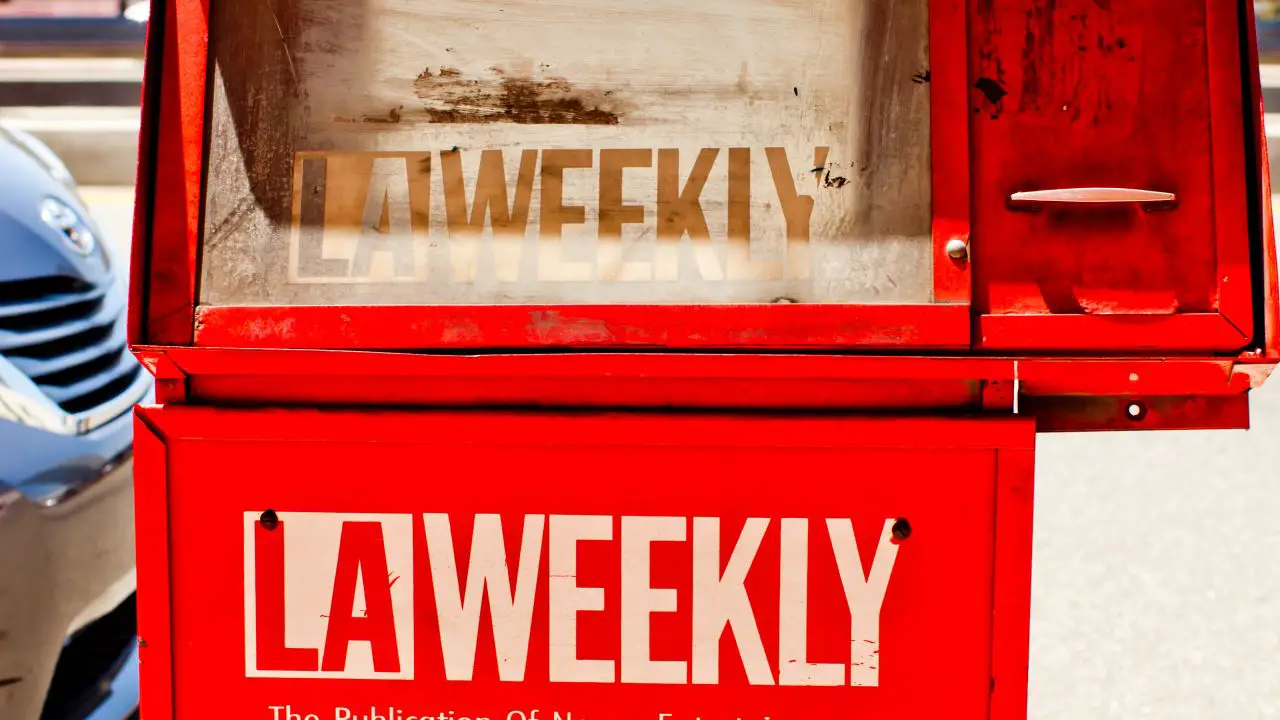The war against journalism and the free press has touched down in Los Angeles with the mysterious and hostile take over of the city’s alt-weekly publication, LA Weekly.
The prominent, free publication, which has served the city of Los Angeles since 1978, was taken over in late November when a mysterious third-party media group bought the company and then instituted a wave of mass firings. After an article from LA Weekly’s Keith Plocek and some ensuing Twitter backlash, the company released the identities of half the buyers—six out of twelve total—to provide some degree of transparency. Still, the fact that the media group that made the purchase, Semanal Media LLC, was created specifically for the purpose of buying the weekly publication has made many critics suspicious.
After the acquisition, Semanal Media LLC swiftly gutted the LA Weekly editorial staff, cutting nine out of the thirteen editors and all but one staffer. The new operations manager, Brian Calle, says some positions will be offered to previous staff in order to rebuild.
Those who were laid off, however, did not leave quietly. The previous editorial staff instigated a big backlash on Twitter, urging readers to unfollow and boycott the weekly publication under its new ownership. The negative press put a stop to LA Weekly’s annual “Sips and Sweets” event, which is critical for courting potential advertisers, a.k.a. the weekly’s primary source of money. Over a dozen vendors pulled out of the event, leading to its cancellation and directly affecting the paper’s bottom line.
Encouraging Free Work and Shady Business
On Dec. 2, following the unrest, the publication posted a tweet “calling all contributors” to submit their work. Though it has since been deleted, the tweet was a call for contributors who wanted to submit their pieces or photos to the magazine soon after the mass firing, though it promised no compensation. In an open letter to their community, the new owners insisted that layoffs were inevitable either way, and that only by selling was LA Weekly able to maintain most of its staff. In addition, representatives of the paper insist that the purchase has no ulterior or political motivations, and that, in regard to the call for unpaid submissions, their intent was to only not pay those contributors who did not wish to be paid; all formerly compensated freelancers will continue to be compensated, according to the owners.
Deleted or not, a tweet pushing the idea that unpaid contributors could carry a culture magazine whose purpose is to serve a population of 3.976 million is unacceptable. The process that journalism clings to provides the well written and thorough stories of Los Angeles culture that is deserving of a paycheck. Though the process needs to adapt, the price of good journalism should not decrease or cost nothing at all.
Besides this, the problem still stands that only half of the buyers have been revealed. How can they push against alleged claims of their future editorial plans for LA Weekly without revealing themselves in full?
A similar take over happened to the Review-Journal of Las Vegas in February 2016 when the son-in-law of the city’s richest businessman, Sheldon Adelson, orchestrated the purchase of the prominent publication. When this happened, the Review-Journal staff was told their paper was purchased and their purchasers would not be revealed. Journalists on staff immediately sought to expose their mysterious buyer starting with the question, “is it the Adelson family?”
Investigations into the company, News + Media Capital Group, created to purchase the publication found their guesses to be true. This habit of creating a company to hide the identity of the buyer for speedy and fast take over is a clear sign of bad intentions for the future of the publications being purchased.
So far this is the only bit of information providing insight to the investors that make up half of the media company. The time has come or is already overdue for Semanal Media LLC to show themselves and their intentions in full.
Those with money and influence are remembering the influence controlling the press has on the public. With the creation and idea of “fake news” and how easily misinformation is devoured by the public, publications are dying out or being bought up left and right. Because journalism has not yet adapted to the speed of access of information the internet provides, journalism is fighting an uphill battle in maintaining its process because it can no longer afford to do so without going out of business. And journalism didn’t plan for business.
Allowing hostile takeovers of publications (or the rich purchasing a publication and their following for personal gain) creates a scary situation where there is no decent journalism. Only subjective agendas. And there can be no real democracy without real and decent journalism. In the current state of the United States, during what is called by some a war on journalism, free press is vital to democracy. Journalism, which is often called the fourth estate, or the watchdog, to the government, should never exist to influenced by the government or even controlled by the rich. It should only and always exist to inform the public of what people of power do behind the backs of the public.
What Next?
Journalism must adapt. The previous LA Weekly editorial staff must not give up and LA Weekly’s readership, including those who don’t read LA Weekly, must pay attention. The takeover of LA Weekly is a small example of the danger the future of journalism faces if it can not adapt and if the public can no longer appreciate its purpose. The freedom of speech is the first and foremost protected right of citizens in the United States. Journalism, exclusively, is protected in the Bill of Rights. If this alone is not proof of importance to democracy, I am not sure what is. Allowing the rich to have power over and influence the voice of truth based on their personal agendas and whims allows those with too much power to have too much influence.
Journalism as it exists today lives in between a rock and a hard place. As true and honorable journalists work endlessly to still provide the truth the public deserves to know and understand, grant them patience as they adapt. Demand more from those in positions of power and empower the ones who seek to expose the truth to the public.

















